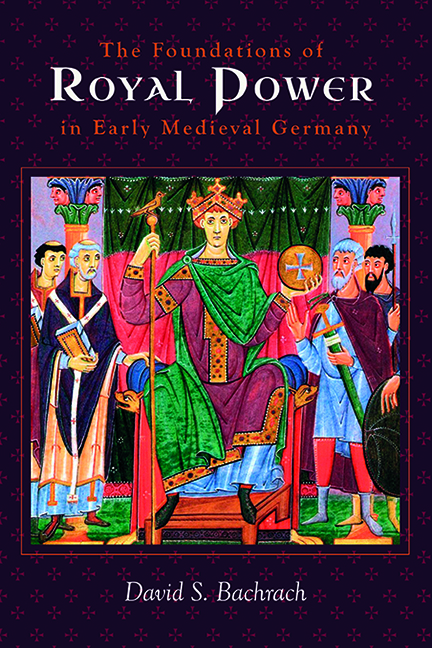 The Foundations of Royal Power in Early Medieval Germany
The Foundations of Royal Power in Early Medieval Germany Book contents
- Frontmatter
- Dedication
- Contents
- List of Illustrations
- Acknowledgments
- List of Abbreviations
- Maps
- Introduction
- 1 The Economy of Carolingian East Francia and Ottonian Germany
- 2 Material Assets of the Royal Fisc
- 3 Taxes, Tolls, and Other Regalian Rights
- 4 Ecclesiastical Resources at the Ruler’s Disposal
- 5 Toward an Analysis of Royal Expenditures: The Iter Regis and the Cost of Defense
- Conclusion
- Appendix 1 Fiscal Properties held by the Rulers of East Francia and Germany, 887–1106
- Appendix 2 Fortifications held by the Royal Government during the Reigns of Henry I and Otto I
- List of Key Terms
- List of Key Dates
- Bibliography
- Index
Introduction
Published online by Cambridge University Press: 16 July 2022
- Frontmatter
- Dedication
- Contents
- List of Illustrations
- Acknowledgments
- List of Abbreviations
- Maps
- Introduction
- 1 The Economy of Carolingian East Francia and Ottonian Germany
- 2 Material Assets of the Royal Fisc
- 3 Taxes, Tolls, and Other Regalian Rights
- 4 Ecclesiastical Resources at the Ruler’s Disposal
- 5 Toward an Analysis of Royal Expenditures: The Iter Regis and the Cost of Defense
- Conclusion
- Appendix 1 Fiscal Properties held by the Rulers of East Francia and Germany, 887–1106
- Appendix 2 Fortifications held by the Royal Government during the Reigns of Henry I and Otto I
- List of Key Terms
- List of Key Dates
- Bibliography
- Index
Summary
Fundamental to understanding the obligations, duties, and power of any government is an assessment of the resources available to pursue its aims and objectives. This view, of course, is not simply a retrospective observation by modern historians, but was central to the conception of royal power and authority in early medieval Europe. Typical in this regard is the emphasis by Charlemagne's grandson Nithard (died 844) on the equitable distribution of the material assets associated with the imperial government of Louis the Pious (814–840). Nithard made these observations in the context of his discussion of the formal peace agreement among Louis’ sons Lothair I (840–854), Louis the German (840–876), and Charles the Bald (840–877) at Verdun in 843. As a senior office holder under both Louis the Pious and Charles the Bald and as an official whose service included helping to supervise the great inquest that paved the way for the divisio at Verdun, Nithard certainly understood the import of his description of these events. In a similar vein, it is no accident that when Widukind of Corvey, writing in the 960s, discussed the elements that were necessary to establish oneself as king, he emphasized the possession of fortresses, arms, and large numbers of soldiers alongside good fortune and an aptitude for rule. Toward the end of the early medieval period, William the Conqueror's Domesday Book similarly highlights the ruler's own view of the essential role of material resources in the carrying out of governmental policy.
The present study, with its focus on the material resources for royal rule, began as a single chapter in what was to be a book-length investigation of royal government in Carolingian East Francia and Ottonian Germany, with an emphasis on the actual practice of governance by royal officials both at the center, in the context of the court, and in the localities, particularly at the level of the pagus. Government, in this context, is to be understood as the actions by the ruler and those to whom the ruler delegated authority to carry out the public responsibilities of the polity. These responsibilities were enunciated in a succinct form by Widukind of Corvey in his depiction of the coronation ceremony for Otto I at Aachen on 7 August 936.
- Type
- Chapter
- Information
- The Foundations of Royal Power in Early Medieval GermanyMaterial Resources and Governmental Administration in a Carolingian Successor State, pp. 1 - 26Publisher: Boydell & BrewerPrint publication year: 2022
